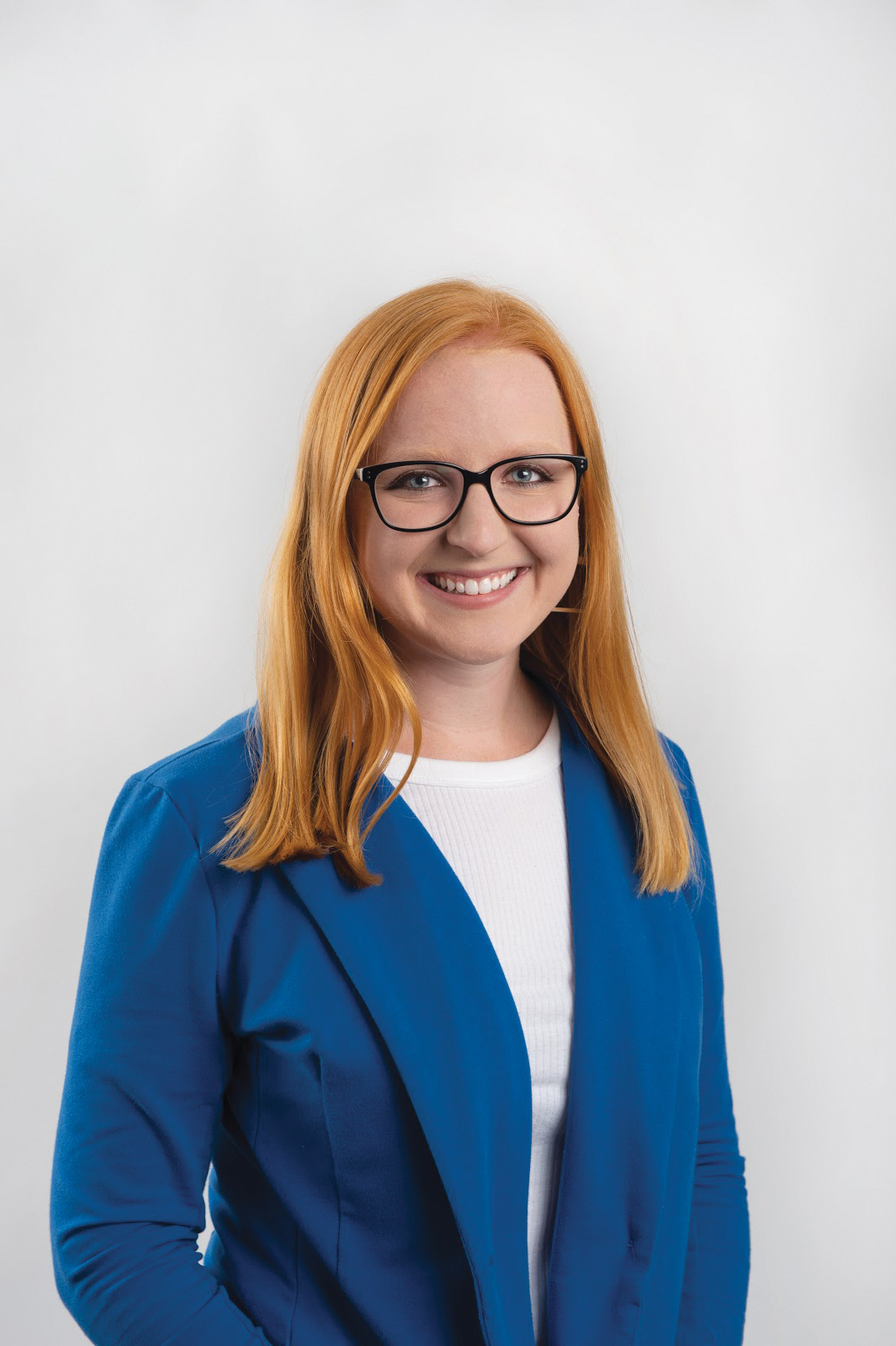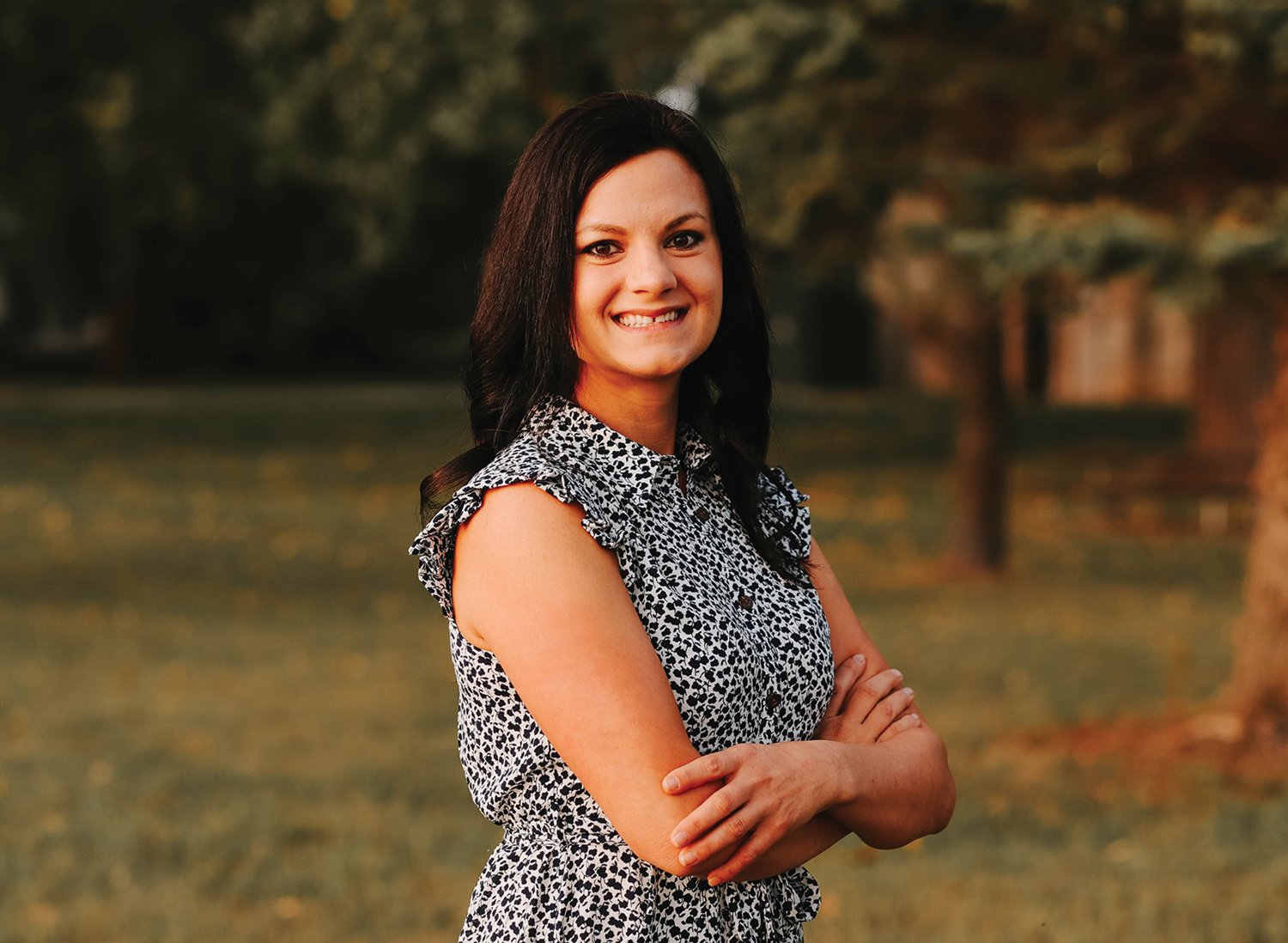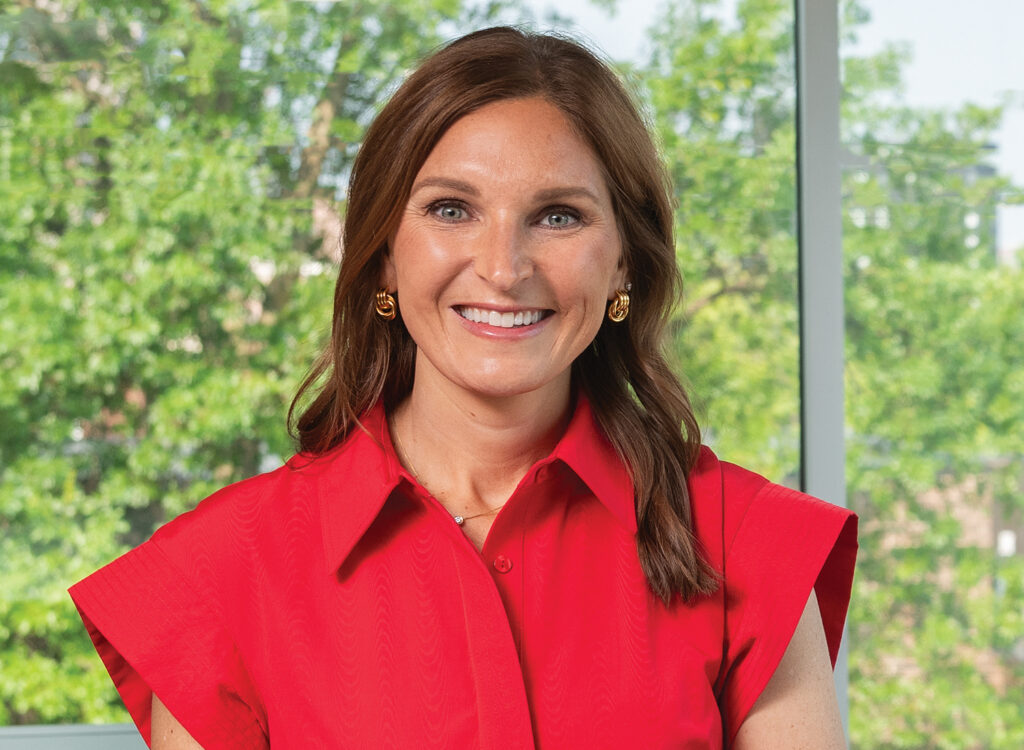Meet Breanna Horsey
Executive director, Sustainable Iowa Land Trust

Family: Husband Tim, 10-year-old daughter Amelia, adult stepson Bazyl, dog Vinny, chinchilla Mango
Education: Bachelor’s in environmental science, graduate degree
in organizational leadership from Buena Vista University
Hometown: Angleton, Texas, currently lives in Storm Lake
Despite spending a lot of time outdoors as a child, growing up in the “chemical plant region” of Texas meant Breanna Horsey had no awareness of environmental issues or impact.
“In those regions, it’s not something they talk about,” she said.
It wasn’t until she lived in Houston after high school, working in the oil and gas industry, and when Hurricane Rita caused major flooding, that conversations around climate change really started to become a presence in her life, she said.
“I started to learn so much more about climate change and the impact that humans are having on the earth. That’s what drove me to want to be part of the change,” Horsey said.
She eventually met her husband, Tim, a native Iowan, moved to Storm Lake in her late 20s, and began to learn more about the effects that agriculture has on soil. After spending time at home with their daughter for a few years, she decided to go to Buena Vista University and major in environmental science.
Horsey said she had taken a few community college courses back in Texas, but said college wasn’t really an option for her growing up. Part of her decision to go back to school while in her 30s was to be an example of what women are capable of for her daughter. She graduated with her bachelor’s degree in 2020, and her master’s in 2022.
Before being hired as executive director of the Sustainable Iowa Land Trust earlier this year, Horsey had worked as a data analyst, an urban conservationist and executive director of Storm Lake United.
SILT is a statewide organization based in West Branch that strives to preserve Iowa farmland for sustainable table food farming by making sure future generations of Iowans have access to affordable farmland and the food it can grow.
The following conversation has been edited and condensed for clarity.
Before you started at SILT, you worked as the executive director of Storm Lake’s chamber of commerce. What lessons did you take from your time there that you’re bringing into your role now?
Specifically, outreach with member businesses and donors, and finding that connection between what people are passionate about and how we can use that to connect them with something that will leave their legacy or match their donation to a cause. With economic development, you have to understand the needs of the community in order to serve them. That’s applicable to SILT and where we’re targeting our outreach to. We want to be a resource. We want people to come to us and we want to be a resource to landowners. Finding where that desire is and where we can serve is the first priority.
What drew you to SILT?
I love the outreach aspect. I love connecting with people that are passionate, and I love being part of the solution. I have a real desire to gain fulfillment in my career because as a family, we want to relocate. With a daughter that’s in fourth grade, I was looking for a role that would be my 10-year plan. And in order to give 10 years of your life to an organization, for me, it has to have meaning. And I got that with SILT. [The Horseys are looking to relocate to either the Des Moines or Iowa City area this summer.]
What are your goals for the organization?
Our first goal is to build energy and awareness around what SILT does. We want people to know that we are a resource, that we’re an option for landowners. How we can become known in Iowa is our first goal. I think SILT has such an amazing model. There’s exponential growth opportunities for SILT. Down the road, our long-term plan is to expand outside of Iowa. Our first focus is on Iowa, of course. This is where our heart is. We want to complete our mission here, and then we want to expand.
Agriculture is a male-dominated industry, and yet SILT has majority women on staff. Speak to the power of that.
SILT wants to represent the parts of Iowa that lack representation in agriculture. Not just women, but minorities, or people that can’t afford typical farmland. Our team of women has shown what can happen when we come together and work together to push an effort forward. Our founder was a woman. We have a lot of female representation on our board. It’s very refreshing to see, and I think that’s more common in nonprofits because of our heart and our determination to be advocates in society. A lot of what we do is advocate for those around us.
When I talked with SILT founder Suzan Erem a few years ago, she spoke at length about the numerous barriers she faced in getting SILT up and running. Do you find that an organization like SILT still struggles to be taken seriously in the agriculture industry here in the state?
There’s a challenge in Iowa in not appearing like we are fighting against conventional farmers. We want to work with conventional farmers. We’re not trying to take anyone’s land. We’re trying to preserve farmland for growing food. And I think that’s one area where we can really shine, working with existing farmers to parcel off small pieces of property. And as a nonprofit, we don’t have unlimited funds for advertising and marketing.
Farmers are notoriously stubborn. How do you work with people who are set in their ways, or don’t like being told what to do?
The answer is always education and awareness. I think a lot of that resistance comes from not being aware of what is happening, or that there is a problem. If we start at a foundational level of education and awareness with new generations, in 10 years this won’t be a new idea. You have to start at the bottom and work your way up. Secondly, developing relationships, being present, being a resource, and talking with people and really getting to know them. What are they passionate about? How can we help connect that passion with our mission? We’re not the enemy. We are a resource, we’re doing something that’s great, and that I think that people will welcome us.
What does Iowa stand to lose if there are no sustainable farming practices?
So many landowners are approaching the retirement age right now. If that land is sold to the next biggest landowner in Iowa, we stand to lose access to any land that’s capable of growing food in Iowa. We’re already importing 85% of our food. And that will only exponentially get worse if we continue to lose farmland to major corporations or to development. It doesn’t take a lot. We only need a little bit to be able to sustain Iowa. We can grow a lot of food on our land.
We want consumers to at least have the option to buy local food. And we want farmers that want to grow food in a sustainable way to have access to land. By lowering the cost of land, by placing an easement on it, or placing it in a trust, we’re ensuring that that land is going to be affordable for as long as the law allows us to hold that property.
What are some of the barriers that farmers or want-to-be farmers face in terms of having a sustainable farm-to-table farm?
Having access to the land. And there’s barriers for immigrant farmers that want to farm and not having a support network. If you go to the bank to take out a small loan and tell them you are starting an organic food farm, they’re not handing out money like they are to conventional farmers. We want to take away that financial barrier and be a resource for our farmers as well.
The market in the past has been a barrier, and not having a demand for local food. But that has changed over the last few years. There is now a demand for local food from restaurants that are serving farm-to-table. If you look at farmers markets across Iowa, they are busier than they have ever been. It is really a great time to jump headfirst into sustainable farming. People want to support it.
What’s one thing that you’re really enjoying right now?
I’m really enjoying traveling a lot. Our family has a goal of making it to all seven continents. Last year, we visited Eastern Africa. We went to Kenya and Uganda. Travel is an important part of our lives.
I’m also really enjoying audiobooks and podcasts that are relevant to my role. I feel like I’m learning, while spending a lot of time on the road until I relocate, and completely immersing myself in all of that.
Are there any that you’d recommend?
Right now I’m reading “What Your Food Ate.” And I think that it speaks volumes to why [SILT’s] mission is what it is and how it affects everyone. Our soil affects what our food contains. For that reason, we should be preserving land to grow food locally and doing it in a way that’s healthy for the soil and the food.
What is your favorite place in the state to spend time outdoors in?
Fishing at Bankston Creek [near Dyersville]. We like camping and being outside and we found this neat spot where we always catch a bunch of trout. When the bugs aren’t terrible, it’s very enjoyable.

Emily Kestel
Emily Kestel is the Fearless Editor for Business Record. She covers women’s issues as well as other human interest stories.










